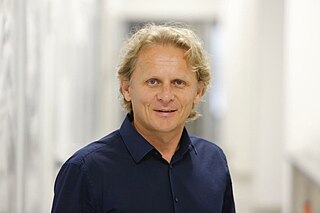Angela Vincent is Emeritus professor at the University of Oxford and a Fellow of Somerville College, Oxford.

GSK plc is a British multinational pharmaceutical and biotechnology company with global headquarters in London. Established in 2000 by a merger of Glaxo Wellcome and SmithKline Beecham, GSK is the tenth largest pharmaceutical company and #294 on the 2022 Fortune Global 500, ranked behind other pharmaceutical companies China Resources, Sinopharm, Johnson & Johnson, Pfizer, Roche, AbbVie, Novartis, Bayer, and Merck Sharp & Dohme.
Sir Richard Brook Sykes is a British microbiologist, the chair of the Royal Institution, the UK Stem Cell Foundation, and the trustees at King Edward VII's Hospital, and chancellor of Brunel University. As of June 2021, he is chair of the UK's Vaccine Taskforce, where he is responsible for overseeing the delivery of the COVID-19 vaccination programme, including preparations for booster programmes and encouraging vaccine innovation in the UK.

The Institute of Psychiatry, Psychology and Neuroscience (IoPPN) is a research institution dedicated to discovering what causes mental illness and diseases of the brain. In addition, its aim is to help identify new treatments for them and ways to prevent them in the first place. The IoPPN is a faculty of King's College London, England, previously known as the Institute of Psychiatry (IoP).

The Cambridge Biomedical Campus is the largest centre of medical research and health science in Europe. The site is located at the southern end of Hills Road in Cambridge, England.

Tadataka "Tachi" Yamada KBE was a Japanese-born American physician and gastroenterologist. He was a venture partner of Frazier Healthcare Partners.
Sir Menelaos (Mene) Nicolas Pangalos is a British neuroscientist of Greek descent.
Gillian Patricia Bates FMedSci FRS is a British biologist. She is distinguished for her research into the molecular basis of Huntington's disease and in 1998 was awarded the GlaxoSmithKline Prize as a co-discoverer of the cause of this disease. As of 2016, she is Professor of Neurogenetics at UCL Institute of Neurology and the co-director of UCL Huntington's Disease Centre.
The pharmaceutical industry in the United Kingdom directly employs around 73,000 people and in 2007 contributed £8.4 billion to the UK's GDP and invested a total of £3.9 billion in research and development. In 2007 exports of pharmaceutical products from the UK totalled £14.6 billion, creating a trade surplus in pharmaceutical products of £4.3 billion.
Dario Renato Alessi is a French-born British biochemist, Director of the Medical Research Council Protein Phosphorylation and Ubiquitylation Unit and Professor of Signal Transduction, at the School of Life Sciences, University of Dundee.

David Tudor Jones is a Professor of Bioinformatics, and Head of Bioinformatics Group in the University College London. He is also the director in Bloomsbury Center for Bioinformatics, which is a joint Research Centre between UCL and Birkbeck, University of London and which also provides bioinformatics training and support services to biomedical researchers. In 2013, he is a member of editorial boards for PLoS ONE, BioData Mining, Advanced Bioinformatics, Chemical Biology & Drug Design, and Protein: Structure, Function and Bioinformatics.
Graham Leon Collingridge is a British neuroscientist and professor at the University of Toronto and at the University of Bristol. He is also a senior investigator at the Lunenfeld-Tanenbaum Research Institute, Mount Sinai Hospital in Toronto.

Ivan Đikić is a Croatian-German molecular biologist who is the Director of the Institute of Biochemistry II at Goethe University Frankfurt.
Ann Jacqueline Hunter CBE FMedSci FBPharmacolS FRSB is a British scientist who is a board director of BenevolentAI. Hunter is also a visiting professor at St George's Hospital Medical School and Imperial College. She is Chair of the Trustees of the Sainsbury Laboratories at Norwich, Chair of the Board of the Stevenage Bioscience Catalyst and Chair of the Board of Brainomix. She was previously CEO of the Biotechnology and Biological Sciences Research Council.
Edward Thomas Bullmore, is a British neuropsychiatrist, neuroscientist and academic. Since 1999, he has been Professor of Psychiatry at the University of Cambridge and since 2014, Head of the Department of Psychiatry. In 2005, he also became Vice-President of Experimental Medicine at GlaxoSmithKline while maintaining his post at University of Cambridge.
David Chaim Rubinsztein FRS FMedSci is the Deputy Director of the Cambridge Institute of Medical Research (CIMR), Professor of Molecular Neurogenetics at the University of Cambridge and a UK Dementia Research Institute Professor.
Melissa Hanna-Brown is a British pharmacologist. She works for Pfizer UK and is a visiting professor at the University of Warwick.

The New Frontiers Science Park is a science park in Essex, on a redeveloped research site of GlaxoSmithKline (GSK).

Fiona Hamilton Marshall is a British pharmacologist, founder and Senior Vice President of Discovery, Preclinical & Translational Medicine at Merck & Co. She will become the next president of the Novartis Institutes for BioMedical Research. She previously served as Chief Scientific Officer at Heptares Therapeutic, where she was Vice President of the Japanese biopharmaceutical company Sosei. She was elected Fellow of the Academy of Medical Sciences in 2016 and the Royal Society in 2021.
Maddy Parsons is a British cell biologist who is a professor and Associate Dean for Impact & Innovation at King's College London. She is the Director of the Nikon Imaging Centre. Her research looks to understand the fundamental mechanisms that underpin cell adhesion and migration. She is Chair of the Medical Research Council Molecular & Cellular Medicine Board.







